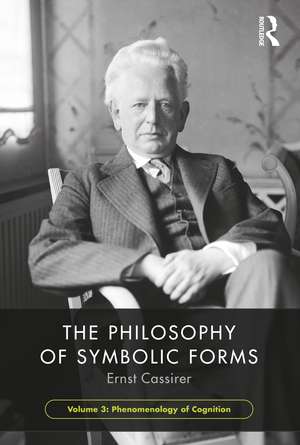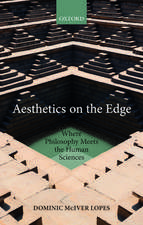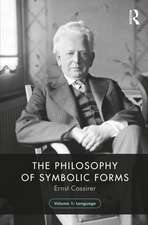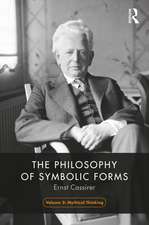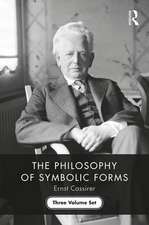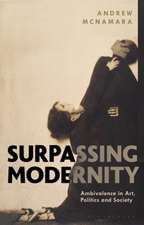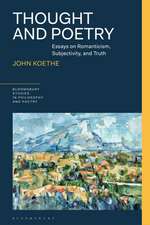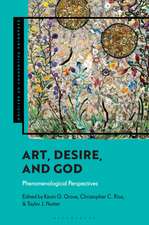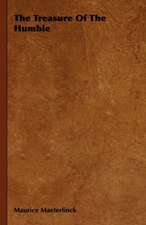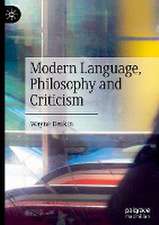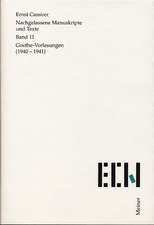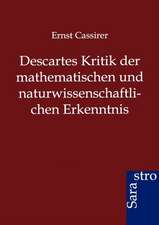The Philosophy of Symbolic Forms, Volume 3: Phenomenology of Cognition: The Philosophy of Symbolic Forms
Autor Ernst Cassirer Traducere de Steve G. Loftsen Limba Engleză Hardback – 25 sep 2020
Echoing his work on Kant, Cassirer begins The Philosophy of Symbolic Forms with the problem posed by the meaning of being for philosophy since Plato. But Cassirer also shows that this problem gains new significance with Kant and with the development of modern culture. Cassirer weaves his conception of the development of knowledge into a broadly Kantian and German idealist dynamic-historical conception of significance and of experience that refuses to accept a fundamental opposition between literary, philosophical and scientific culture. In consequence of his great vision grounded in careful reflection and argument, Cassirer’s systematic conception of the Copernican cosmopolitan-cosmological revolution is still philosophically and scientifically unmatched in contemporary philosophy on both sides of the Atlantic and of the Pacific.”
Pierre Keller, Professor of Philosophy, University of California, Riverside, USA.
This new translation makes Cassirer’s seminal work available to a new generation of scholars. Each volume includes a translator’s introduction by Steve G. Lofts, a foreword by Peter E. Gordon, a glossary of key terms, and an index.
| Toate formatele și edițiile | Preț | Express |
|---|---|---|
| Paperback (1) | 246.16 lei 43-57 zile | |
| Taylor & Francis – 7 feb 2023 | 246.16 lei 43-57 zile | |
| Hardback (1) | 593.06 lei 43-57 zile | |
| Taylor & Francis – 25 sep 2020 | 593.06 lei 43-57 zile |
Preț: 593.06 lei
Preț vechi: 697.71 lei
-15% Nou
Puncte Express: 890
Preț estimativ în valută:
113.48€ • 118.80$ • 93.90£
113.48€ • 118.80$ • 93.90£
Carte tipărită la comandă
Livrare economică 07-21 aprilie
Preluare comenzi: 021 569.72.76
Specificații
ISBN-13: 9781138907249
ISBN-10: 1138907243
Pagini: 644
Dimensiuni: 156 x 234 x 38 mm
Greutate: 1.14 kg
Ediția:1
Editura: Taylor & Francis
Colecția Routledge
Seria The Philosophy of Symbolic Forms
Locul publicării:Oxford, United Kingdom
ISBN-10: 1138907243
Pagini: 644
Dimensiuni: 156 x 234 x 38 mm
Greutate: 1.14 kg
Ediția:1
Editura: Taylor & Francis
Colecția Routledge
Seria The Philosophy of Symbolic Forms
Locul publicării:Oxford, United Kingdom
Public țintă
Postgraduate and UndergraduateCuprins
Foreword Peter E. Gordon Translator’s Preface Steve G. Lofts Translator’s Introduction: A Phenomenology of Symbolic Creative Cognition: the Unfolding of the Symbolic Function and the Construction of a Pure Theory of the Symbolic Steve G. Lofts Translator’s Acknowledgements Steve G. Lofts. Preface Introduction Part 1: The Expressive Function and the World of Expression 1. Subjective and Objective Analysis 2. The Expressive Phenomenon as the Basic Element of Perceptual Consciousness 3. The Expressive Function and the Mind-Body-Problem [Leib-Seelen-Problem] Part 2: The Problem of Representation [Repräsentation] and the Construction of the Intuitive World 1. The Concept and the Problem of Representation [Repräsentation] 2. Thing and Property 3. Space 4. The Intuition of Time 5. Symbolic Pregnance 6. On the Pathology of Symbolic Consciousness Part 3: The Function of Signification and the Construction of Scientific Cognition 1. Toward a Theory of the Concept 2. Concept and Object 3. Language and Science: Thing Signs and Ordinal Signs 4. The Object of Mathematics 5. The Foundations of Natural-Scientific Cognition Appendix: "'Spirit' and 'Life' in Contemporary Philosophy" (1930). Glossary of German Terms Index
Notă biografică
Ernst Cassirer was born in Germany 1874 in the city of Breslau (now Wroclaw, Poland). He taught at Hamburg University from 1919 to 1933, and then at All Souls College, Oxford, before emigrating to Sweden and then to the United States. Through its creative interpretation of Kant’s philosophy combined with a deep knowledge of the role of language and culture, Cassirer’s work is regarded as indispensable to understanding the relationship between the two major traditions in twentieth-century philosophy, the “analytic” and the “continental”. Cassirer’s philosophy is unique, as it sought a common ground between the scientific and humanistic worldviews which frequently divided these two traditions, exemplified in his famous debate with Martin Heidegger at Davos in 1929. His work resulted in the monumental Philosophy of Symbolic Forms as well as several books on the philosophy of humanism and the Enlightenment. He taught at the universities of Yale and Columbia in the early 1940s and died in New York in 1945.
Steve G. Lofts is Professor of Philosophy at King’s University College. He is the translator of Cassirer’s The Logic of the Cultural Sciences and The Warburg Years (1919–1933): Essays on Language, Art, Myth, and Technology.
Steve G. Lofts is Professor of Philosophy at King’s University College. He is the translator of Cassirer’s The Logic of the Cultural Sciences and The Warburg Years (1919–1933): Essays on Language, Art, Myth, and Technology.
Recenzii
'The three volumes of The Philosophy of Symbolic Forms focus on language, myth, and science respectively, offering fascinating, if necessarily fragmentary and speculative, accounts of how each develops in the direction of increasing freedom and universality… the basic insight of The Philosophy of Symbolic Forms is one that continues to inform the humanities today. The categories we use to understand the world aren’t a passive reflection of the way things really are; rather, we actively create systems of meaning that evolve over time.' - Adam Kirsch, New York Review of Books
Descriere
The Philosophy of Symbolic Forms is Cassirer's most important work. This major new translation brings his magnum opus to a new generation of students and scholars. Volume 3: The Phenomenology of Knowledge is an exploration of epistemology, perception and consciousness across the human sciences
